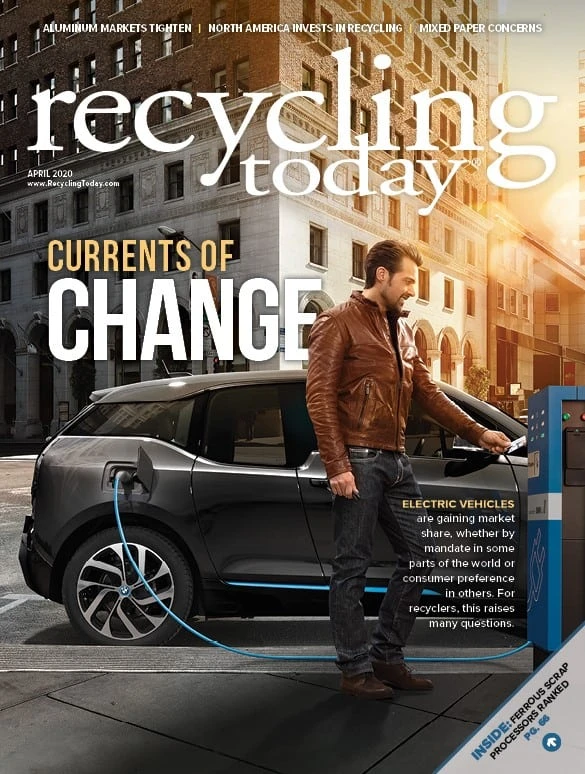Located in the heart of the Blue Ridge Mountains in western North Carolina, Asheville Waste Paper Co. Inc. has been offering recycling services for nearly 79 years.
The family-owned business launched in 1941 after Carl McMahan, a garbage truck driver for the city of Asheville, North Carolina, noticed the city was sending too much paper and aluminum to landfills that could be recycled. So, McMahan started Asheville Waste Paper by collecting cans and paper at his home, and he eventually opened a facility in town.
The company has stayed in McMahan’s family and is today led by his granddaughter, Annette Pace, and great-grandson Trey Pace along with his wife Gabe Pace. The company employs 15 people, and it focuses primarily on recycling various grades of paper from commercial customers. It also has several drop-off zones to collect cardboard from the general public. Trey says the company processes and bales about 3,000 tons of material in a month, and it has three balers it uses on-site in Asheville as well as an industrial shredder, two guillotines and forklifts.

Overcoming trials
Trey says 2019 was a tough year for Asheville Waste Paper. In addition to working around declining commodity prices, the company had to limit the commodities it accepted to stay afloat. The company also decided to close its facility in Kingsport, Tennessee. Trey, who serves as the company’s vice president, says the Kingsport facility had been operating for nearly 50 years at that point.
The company also was facing challenges with equipment at its site in Asheville throughout most of 2019.
“It was a difficult year with two of our main balers down,” Gabe says, who serves as the company’s chief administrative officer.
Trey adds that the company operated a foreign-made single-ram horizontal baler that was causing the company a lot of headaches. He says the company persistently had to fix issues on that baler but determined it was “a losing battle” to keep that machine.
Although 2019 proved to be challenging for Asheville Waste Paper, a nearly 40-year-old single-ram horizontal baler from American Baler helped to keep things going when other machines were broken.
“It got us through the hard times,” Trey says of the 40-year-old machine. “That machine has held up for us, and we are very happy with it.”
He adds that experiencing the longevity of that machine prompted him to invest in a new American Baler machine to replace its foreign-made single-ram horizontal baler at the end of 2019.
Nice end to the year
In July of 2019, Asheville Waste Paper reached out to American Baler about purchasing a new machine. Trey says American Baler had recommended the company invest in its 8043HS-10T75 single-ram horizontal autotie model.
Around that time, American Baler also connected the North Carolina recycler with Recycling Equipment Inc. (REI), Newton, North Carolina, to provide the company with more information.
“A gentleman from REI came and presented us with information on the baler, its productivity levels,” Trey says. “He sent me videos of it and information on technology it had. It was pretty much a no-brainer decision” to purchase the machine.
REI began to work on installing the new baler in November 2019. Asheville Waste Paper sent its foreign-made horizontal baler to a scrap yard, and the new 8043HS-10T75 horizontal single-ram autotie American Baler model took its place in the facility.
In December 2019, Asheville Waste Paper officially installed the single-ram horizontal autotie baler from American Baler. Gabe says the company even hosted a ribbon-cutting ceremony with its employees for the new machine.
“It was a super big deal for us to be able to do that at this time in the recycling market,” she says.
With American Baler’s 8043HS-10T75 single-ram horizontal model, Trey says operations have been running much more smoothly.
“It’s a lot easier to operate,” he says. “Everything is on a screen and you can change bale density from a screen. It’s extremely quiet, too. We can run everything a lot faster. It’s just a lot more user friendly.”
WANT MORE?
Enter your email to receive our newsletters.

Explore the April 2020 Issue
Check out more from this issue and find your next story to read.
Latest from Recycling Today
- Hitachi forms new executive team for the Americas
- Southwire joins Vinyl Sustainability Council
- Panasonic, Sumitimo cooperate on battery materials recycling in Japan
- Open End Auto Tie Balers in stock, ready to ship
- Reconomy names new chief financial officer
- ICIS says rPET incentives remain weak
- New Jersey officials award $16.2M in annual recycling, waste reduction grants
- Linder Industrial Machinery announces leadership changes





